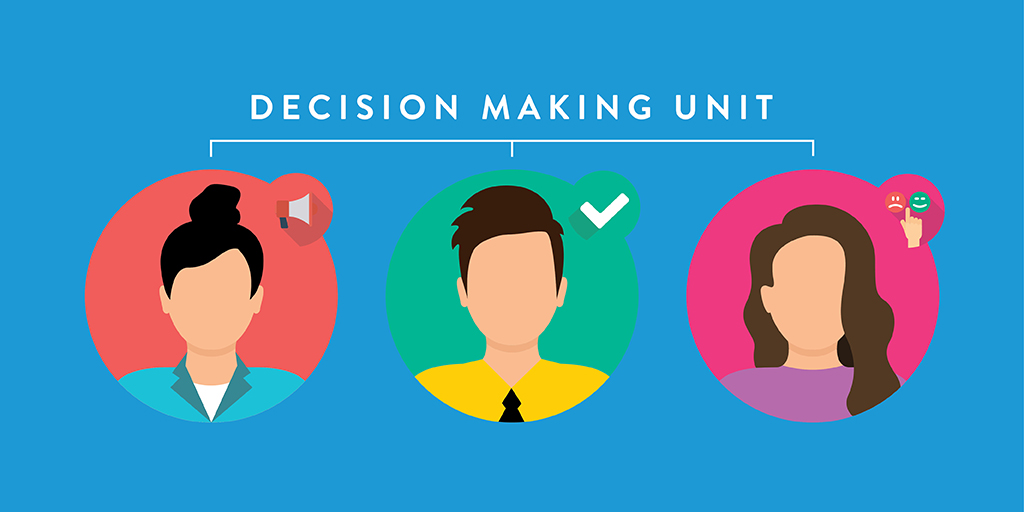21 Oct B2B loyalty: The role of the decision making unit

Improving the customer experience is high on the agenda for the majority of brands across the globe. Customer expectations are ever-evolving, and these expectations have inevitably spilled over into the B2B world.
The path to loyalty may differ across B2C and B2B, but the goal is absolutely the same. For any brand to be successful, they need to invest in their customers/buyers and build genuine trusted relationships – which will ultimately result in long-term loyalty.
B2B loyalty is more complex, due to a number of factors.
There are various stakeholders involved in the B2B decision making unit, each with different intentions and motivations. Marketing legend, Philip Kotler defines the decision making unit as “all individuals and groups that take part in the decision making process relating to the negotiation of products/services.”
It takes time to earn the ‘trusted advisor’ status from each stakeholder in the decision making unit, before they are willing to commit. There’s also lengthy sales cycles involved, B2B investments are much higher than that of a simple B2C transaction, so there’s a lot of consideration before any decisions are finalised. Also, the brand may not be in a position to buy yet, so there’s the importance of ensuring that your brand is front of mind when they are ready. This alone takes a lot of commitment and resources. Picking up the phone twice a year is no longer enough.
Decision Making Unit
We recently shared an article ‘STOP….and think like a customer’. Which absolutely applies in the B2B world when considering the decision making unit. The best way to understand your customer is to put yourself in their shoes. B2B is no different. Each stakeholder will have rational and emotional needs and are looking for a solution that could help them do their job better and deliver a fantastic outcome for their brand. Let’s break these roles down further.
Decider – The ultimate decision maker. The person with the authority to give the final sign off. The decider won’t typically be involved in the day to day. They will take counsel from influencers and initiators, however, they will want reassurance that the right decision was made throughout the relationship. ROI is of course the most important, so is having easy access to the supplier’s leadership team, as well as continuous internal feedback.
Influencer – Although they don’t have final authority, these stakeholders play a pivotal role in the final decision, with the decider putting a lot of trust in the influencer, which makes the influencer a key point of contact. Often, there’s a number of influencers across different departments of the business. For example, marketing may be investing in new technology to help them engage better with their customers, while the IT department will be looking for a solution that easily integrates with their existing systems and reassurance of data privacy etc. The supplier will need to have a different conversation with marketing to the one they’ll have with IT – providing evidence which proves why their product can provide solutions for both departments.
User – These stakeholders have minimal input on the choice of supplier, but will be interacting and the most engaged with the product/service so their feedback will be sought internally. They are also more likely to share their opinions with the market – be it positive or negative. Remember that…..these users could be some of your greatest advocates!
Initiator – These stakeholders recognise their brand has a need or a problem and actively search for providers who can deliver the best solution. They play a vital role and spend time doing their research, approaching only the brands who they are most impressed with. They are also very close to the problem so can deliver detailed briefs. Make sure you ask the initiator as many questions as possible to ensure you can respond with a solution that ticks all the boxes.
Gatekeeper – We’ve all had to deal with a gatekeeper at some point. Their role is to manage access to other members of the decision making unit. This includes passing information across too. It’s easy to feel frustrated with a gatekeeper if you aren’t getting access, however remember that they’re only doing their job. The best approach for the gatekeeper is to be kind, patient and transparent at all times.
As mentioned, it takes considerable time to gain the trust and respect across the various layers of the decision making unit. Put yourself in their shoes, for identifying their challenges, and also their experience across the buyer journey and beyond. Consider everything possible that can make their lives easier and help them to do their jobs better, whilst delivering the broader results they need.
The consumerisation of B2B sales and marketing has meant a huge shift. B2B buyers are looking for highly personalised experiences (the same as they receive in their personal lives as a customer). The commercial success of B2B depends on the brand’s ability to deliver. Building strong relationships across the entire decision making unit is absolutely imperative. Competition is tough, and the best way to gain a competitive edge is to truly understand the problems and challenges your buyer’s have.
Customology are customer growth and retention specialists. We have extensive experience working with B2B brands, supporting their loyalty and growth strategies. If you’re keen to learn more about our capabilities, please contact one of our Customologists on 1300 264 549 or hi@customology.com.au
|
Listen to...
|


